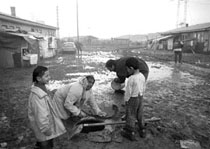|
June 12 , 2000 Poverty in America: Turning
the Tables Allied
Forces Poverty
in a Gilded Age Out
of Sight Leave
the Kids Alone The
Union Difference Down
and Out on Polk Street Other Features: Star
Wars: Episode Two "This
Is Not Life. This Is Prison" Bosnian
Serbs Still Look to Belgrade Editorial Appall-O-Meter Marching
On The
Other Side of the Street Going
to Waste Profile
Forgotten
America Ancient
Daze A
Class by Itself A
Different Point of View |
"This Is Not
Life.
This Is Prison."
By Richard Mertens
Obilic, Kosovo
You
don't need a map to find the Gypsy camp here. You just steer for the big
smokestack on the edge of town. It belongs to a coal-fired power plant
and can be seen 20 miles away. Nearby, between a dusty, pot-holed road
and small hills of ash, is a cluster of wooden barracks. An eight-foot
mesh fence surrounds the barracks, topped by two strands of barbed wire.
That's the camp.
 |
|
Roma
fled to the camp in Obilic after Albanians burned and looted their
homes last summer. Credit: Kael Alford
|
Eight hundred Gypsies, or Roma, live here. A group of children crowds
excitedly around a pool of water that is the color of motor oil. Not far
away, women wash clothes in metal basins, standing in ankle-deep mud around
a water spigot. The men are doing little, although one sits apart from
the others, carving a table leg with a kitchen knife. A tape deck blasts
Roma dance music. The air reeks of dirty water and human excrement. Outside
the fence, the countryside is turning a rich green; inside there is hardly
a blade of grass.
The scene is strangely familiar. Just a year ago, ethnic Albanians were
crowding into refugee camps in Albania and Macedonia as they fled Serb
terror across the border. There were the same swarms of children, the
same trampled earth, the same mixture of boredom, restlessness and despair.
The Albanians are back home now. They are rebuilding their ruined houses,
trying to hustle a living and enjoying their freedom. They also are creating
a whole new class of the persecuted and displaced. Last summer, as the
Albanians returned, they drove out the Roma and looted and burned their
homes.
The fence is not to keep the Roma in, but to keep other people out. "You
see what we have for a future?" asks one man named Ibush Berisha. Until
last year, he worked at the power plant; now he is out of both a job and
a home. He is 23, and he and his wife and child share a room with his
brother's family. He gestures toward an open patch between the barracks.
"We have mud and dirt," he says scornfully. "This is not life. This is
prison."
The future
of ethnic minorities is one of many uncertainties that hang over Kosovo
today, more than a year after the NATO bombings. The West has invested
enormous amounts of time, money and effort in the ravaged province. So
far, the failures stand out more starkly than the successes.
Not everything has gone awry. Thanks in part to Western help, Kosovars
made it through the winter. More than 100,000 homes were damaged or destroyed
at the end of the war last June. In the months that followed, relief agencies
handed out huge quantities of food, clothing, wood stoves, blankets, lumber,
plastic and other building materials. By this spring, houses all over
Kosovo were sporting new roofs.
There is still much to be done: schools and hospitals to be rebuilt, homes
to be repaired and replaced, roads to be smoothed. The damage in Kosovo
is a result not just of war, but of a decade of neglect. And yet the physical
repairs are the easiest part of the job. The West is trying to cobble
together a whole social infrastructure, with improved education and health
care and public institutions that are suited to democracy and a free market.
This work is all the harder because when the Serb authorities left last
spring, they took most of Kosovo's technical and administrative expertise
with them.
![]()
|
In These Times ©
2000
Vol. 24, No. 14 |
